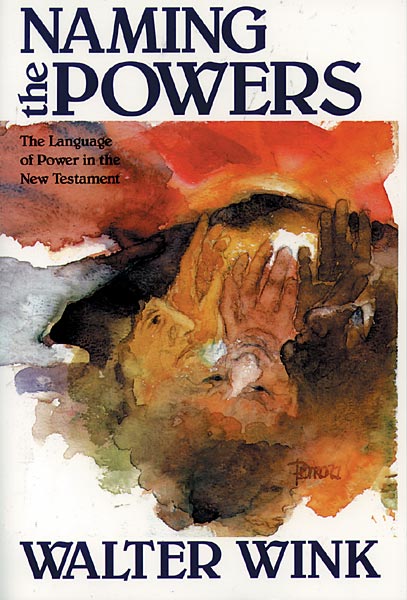Naming the Powers: The Language of Power in the New Testament
"The reader of this work will search in vain
for a definition of power. It is one of
those words that everyone understands
perfectly well until asked to define it. …
Our use of the term 'power' is laden with
assumptions drawn from the contemporary
materialistic worldview. Whereas the
ancients always understood power as the
confluence of both spiritual and material
factors, we tend to see it as primarily
material. We do not think in terms of
spirits, ghosts, demons, or gods as the
effective agents of powerful effects in the
world. …
"Thus a gulf has been fixed between us and the biblical writers. We use the same words but project them into a wholly different world of meanings. What they meant by power and what we mean are incommensurate. If our goal is to understand the New Testament's conception of the Powers, we cannot do so simply by applying our own modern sociological categories of power. We must instead attend carefully and try to grasp what the people of that time might have meant by power, within the linguistic field of their own worldview and mythic systems. …
"I will argue that the "principalities and powers" are the inner and outer aspects of any given manifestation of power. As the inner aspect they are the spirituality of institutions, the "within" of corporate structures and systems, the inner essence of outer organizations of power. As the outer aspect they are political systems, appointed officials, the "chair" of an organization, laws—in short, all the tangible manifestations which power takes. … This hypothesis, it seems to me, makes sense of the fluid way the New Testament writers and their contemporaries spoke of the Powers, now as if they were these centurions or that priestly hierarchy, and then, with no warning, as if they were some kind of spiritual entities in the heavenly places."
—from the Introduction
"Thus a gulf has been fixed between us and the biblical writers. We use the same words but project them into a wholly different world of meanings. What they meant by power and what we mean are incommensurate. If our goal is to understand the New Testament's conception of the Powers, we cannot do so simply by applying our own modern sociological categories of power. We must instead attend carefully and try to grasp what the people of that time might have meant by power, within the linguistic field of their own worldview and mythic systems. …
"I will argue that the "principalities and powers" are the inner and outer aspects of any given manifestation of power. As the inner aspect they are the spirituality of institutions, the "within" of corporate structures and systems, the inner essence of outer organizations of power. As the outer aspect they are political systems, appointed officials, the "chair" of an organization, laws—in short, all the tangible manifestations which power takes. … This hypothesis, it seems to me, makes sense of the fluid way the New Testament writers and their contemporaries spoke of the Powers, now as if they were these centurions or that priestly hierarchy, and then, with no warning, as if they were some kind of spiritual entities in the heavenly places."
—from the Introduction
- This item is not returnable
- Ships in 2 or more weeks
- Kindle - Nook - Google
-
Quantity discount
- # of Items Price
- 1 to 9$32.00
- 10 or more$24.00
$32.00
